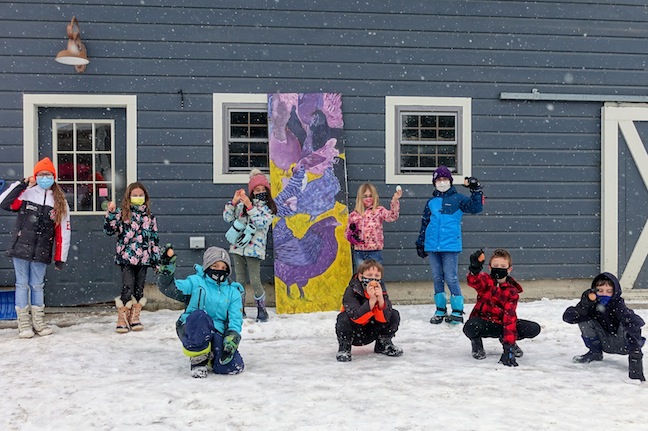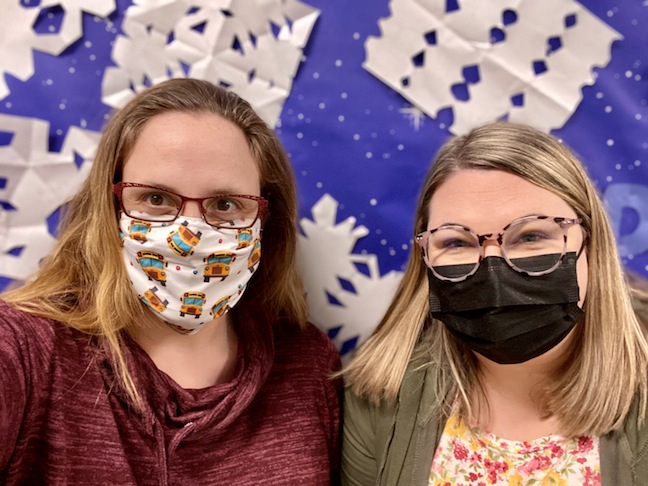ON THE SCENE: Private schools weather COVID-19
- Students at North Country School in Lake Placid show off the eggs they had just harvested on the school farm. (Photo provided)
- North Country School students with clipboards in the snow participate in a “snowpack lab” for their Earth science course. (Photo provided)
- Alicia Keefer, a preschool teacher at St. Agnes School, readies a student to go outside. (Photo provided)
- From left are St. Agens School Principal Catherine Bemis. School and Family Support Coordinator and Spark Program Director Katie Turner. (Photo provided)

Students at North Country School in Lake Placid show off the eggs they had just harvested on the school farm. (Photo provided)
Lake Placid’s private schools — North Country School, Northwood School, and St. Agnes School– have achieved the near impossible by staying open and keeping their students and staff safe during the coronavirus pandemic. Doing so hasn’t been easy. None of them had guidelines to follow, and all have day students — students who live at home and commute to school daily.
Had these schools been island fortresses such as New Zealand, the task would have been more manageable with all connected to the school living together. Instead, each school is integrally linked to the Lake Placid community. Thus, faculty, staff and students living in town have to make an extra effort to ensure they remain safe so as not to carry the virus back to school.
Families who feel that in-class teaching counts toward quality education and trust the schools to keep their children safe have provided critical support. At North Country and Northwood, parents wanted children to be active and remain able to build and maintain friendships.
“Northwood provided three bonuses: in-class learning, small class sizes, and my son could be a part of the ski team, train and race with others,” said Debbie Delay of Syracuse. “I think kids should have face-to-face instruction. The school’s communication with me gained my trust. Being up front with the parents on how they were going to do everything, bringing the kids onboard through testing, the quarantine, and organizing them into cohorts was important, as I wanted to know they would keep my son safe.”
For North Country School, COVID-19 turned out to be an unexpected recruitment tool. Last spring, when COVID hit, many seasonal Adirondackers, who otherwise live in or near urban areas, moved to their homes in our region. Others fled cities after buying homes here. Many came with their families. North Country offered an engaging educational experience for their children, a school where organic food, much of it produced by the kids, was a decades-old practice. Caring for chickens, horses and sheep is part of the students’ school chores.

North Country School students with clipboards in the snow participate in a “snowpack lab” for their Earth science course. (Photo provided)
All three schools stressed the importance of planning and sharing ideas with other schools — in Northwood’s case, with other private schools along with Clarkson University in Potsdam and St. Lawrence University in Canton. Everyone underscored the importance of open, transparent communication with parents, and constant testing.
“Testing was a key aspect of our plan,” said John Spear, faculty member and assistant head for school life at Northwood. “It was hard to figure out because we were doing our lead planning in the summer when testing was not readily available. Sending swabs to a lab that might take seven days or more to get a result was untenable, as an undetected virus could spread throughout the campus in a week. We needed a fast turnaround.”
Northwood found a lab affiliated with MIT that could provide results within 48 hours. That said, they and other schools required that students be tested no more than three days before school started, be tested when they arrived, and also go into quarantine while waiting for the results.
Students at Lake Placid’s private schools were organized by cohort, some based on their primary interest. Northwood organized cohorts to accommodate girls hockey, boys hockey, soccer, snow sports and independents.
“At North Country School, we had two planning goals: first and foremost, to maintain the health and safety of our community; second and inasmuch as possible, to maintain the fabric and culture of a very unique school,” said Matt Smith, director of school. “We looked at this as a challenge — to be better in certain areas, more creative in other areas.”

Alicia Keefer, a preschool teacher at St. Agnes School, readies a student to go outside. (Photo provided)
Their planning process resulted in one of the healthiest school terms on record, due in part to children and staff repeatedly washing their hands, continually wearing masks, and maintaining physical distance, along with continually monitoring everyone’s health. Smith said that it’s all about layering protocols, as no single protocol is perfect. Juxtaposing many protocols has kept the school safe and enabled students to participate in all aspects of school life that North Country is known for. Smith added that the school invested in a robust air filtration system to trap virus particles coupled with in-depth daily cleaning to keep interior spaces in near-mint condition.
All three schools underscored the emotional stress that high-level safety protocols can cause students and staff alike.
Lilian, a St. Agnes elementary student, said, “I don’t think it’s going very good. Masks are annoying. I want to see my friends smiling!”
At St. Agnes, the skills of therapist Trish Friedlander are being tapped to meet the emotional challenges. Friedlander said that while mask wearing helps students remain well physically, it also increases stress and anxiety. Students can’t see facial expressions critical to communication, and they can’t socialize normally. Masks make Friedlander’s work itself more challenging; she too can’t see facial expressions and working with small groups is constrained. Using plexiglass barriers and face shields have helped. But sometimes, what a child needs is a hug.
Dealing with COVID has had also had a big impact on teachers and staff.

From left are St. Agens School Principal Catherine Bemis. School and Family Support Coordinator and Spark Program Director Katie Turner. (Photo provided)
“I’ve learned how much you can fit into the hours of a day,” said Katie Turner, family support coordinator at St Agnes School. “I’ve learned how flexible and resilient the students and faculty can be. People are open to and accepting of things changing so that we can do the things that we want to do. That’s something that I’m excited to carry over into the future.”
Students are learning to make the most of hard-won victories gained by embracing the health protocols of mask wearing, physical distancing and hand washing. They are developing new coping skills. As an example, Olivia, a Northwood student, said that she has taken up knitting.
Yet success comes at a price. Northwood students miss the way they could hang out together, hug a friend and congregate in the New York Ski Educational Foundation lodge after racing practice at the Whiteface Mountain Ski Center.
Still, students are grateful that all three schools make in-person teaching possible. They have learned to organize time better. Quarantine periods are a chance to plan how to make the most of in-person class time and outside activities. Day students living at home appreciate the sacrifices that their parents make to keep them and, by extension, their school communities safe.
“I get to move around my home, which I am very thankful for,” said Haley, a Northwood day student. “I had never realized how that was something to be thankful for.”
“I think we’ve all gotten better at learning how to adapt,” said Angie, a Northwood senior. “It’s good to be learning to deal with and manage a new environment with all the challenges that have come with it. I think it’s cool that we have each other to talk to. Northwood is such a supportive community. You don’t feel you’re alone.”
(Naj Wikoff lives in Keene Valley. He has been covering events for the Lake Placid News for more than 15 years.)




